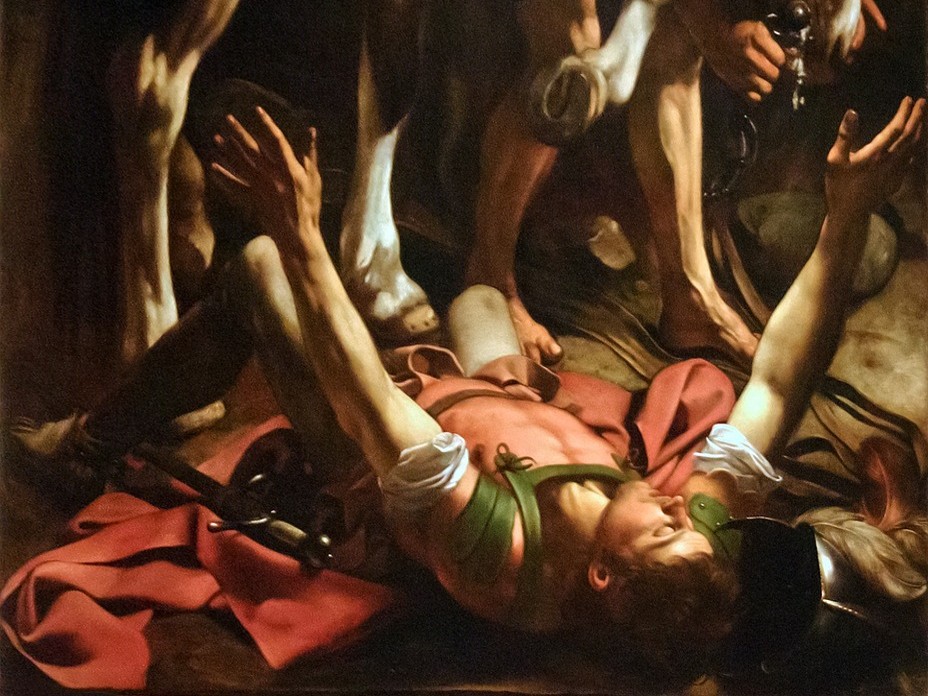Many, many years ago there was a Jewish man living in Damascus in what was and still is Syria. This man was almost certainly from Jerusalem, part of a group of Jewish refugees fleeing persecution for their belief that a man named Jesus of Nazareth was the fulfillment of their holy Scriptures. Followers of this Jesus were being imprisoned and worse—word had it that a young deacon named Stephen had been stoned to death after witnessing to the Good News about Jesus’ death and resurrection. And so this man found himself suddenly on the move, taking up refuge in Damascus.
This man was going about his normal routine one day when suddenly he had a vision of the Lord, Jesus. He had probably heard of other Jesus followers having visions like this; he probably did not think he would ever be so blessed. He heard the voice of Jesus calling out to him, “Ananias.”
The man replied, “Here I am, Lord.” And Jesus told Ananias, “Go over to Straight Street to a house owned by a man named Judas. Ask to see a guest of his, a man named Saul of Tarsus.”
Ananias heart skipped a beat. He had heard of this man from Tarsus, this Saul. Wasn’t he the one that took responsibility for the stoning of Stephen? And weren’t there rumors that he was coming to Damascus to arrest more Jesus-followers?
Jesus continued. “I want you to go to him—he is expecting you, I appeared in a vision to him, too—and I want you to restore his sight.”
Many, many years later in the American south, Booker T. Washington, the renowned educator, the president of the Tuskegee Institute, and perhaps the most famous black man of his day. He was walking in a posh section of town when a wealthy white woman came up to him with a question. Not realizing who Washington was, she asked him—the most famous black educator in the country, a man who had reached a higher esteem in America than perhaps any black man ever—if he’d like to earn a few bucks by chopping some wood for her.

Humility
Ananias and Booker T. Washington were asked to do things that perhaps would make them uncomfortable. Ananias was asked to go and welcome the chief persecutor of his people into his spiritual family. Washington was asked to do something far below his station based on someone making hurtful assumptions about him based on the color of his skin. Both of them were asked to be a part of a relationship that they may not want to be in—Washington with a wealthy white woman who looked down at him like he was a poor sharecropper, and Ananias with a man who had recently overseen the execution of a fellow Jesus-follower.
Both men now have the opportunity to emulate their Lord and Savior. They had a chance to emulate him in perhaps his most dominant virtue, outside of love. They are being given a chance to demonstrate the same humility as Jesus.
Consider Others More Important than Yourselves
In Philippians 2, Saul, now known as Paul, would write,
Do nothing out of selfish ambition or conceit but in humility consider others as more important than yourselves.
What someone was about to do out of humility would change the entire course of Paul’s life. Ananias would choose humility and would choose to minister to Paul.
But he still wasn’t too sure. Jesus’ instructions did not sound like a good idea to Ananias. “Lord, you surely know what this man has done against your people. Surely you know he has the authority to arrest us and drag us to trial in Jerusalem?”
But Jesus replied, “Go anyway. This man is my chosen messenger to take my Gospel to the Gentiles, before kings, and to his fellow Israelites. He will suffer greatly for my sake.”
And so nervously, anxiously, Ananias went to the house of Judas over on Straight Street. He nervously knocked on the door. Judas answered, and Ananias asked to see Saul of Tarsus.
Choosing Humility
Judas invited him in and walked him into the room where Saul was. There Ananias saw the once proud, zealous Pharisee on the floor, praying. He hadn’t eaten for days, and there were something like scales covering his eyes. Ananias joined Saul on the floor and placed his hands on him. “Brother Saul,” he said, trying to mask the fear in his voice. “Jesus sent me to you so that you can regain your sight and receive the Holy Spirit.”
Booker T. Washington smiled at the woman and agreed to help her out. He went over to her house and chopped some wood for her. When he had finished, he carried the logs into her house, where he was recognized by a young girl.
The young girl told the woman who had hired Booker T. Washington who he was and the woman was embarrassed. So embarrassed in fact that she went to his office at the Tuskegee Institute the next day to apologize.
Washington smiled at her. “It’s perfectly all right, Madam,” he replied. “Occasionally I enjoy a little manual labor. Besides, it’s always a delight to do something for a friend.”
Humility Leads to Unity
After Ananias prayed for him, the scales fell from Saul’s eyes and he could see again. The Lord who took his sight had given it back. Would the world look different to Saul now that his sight had returned? Would he see the world through new eyes, the eyes of his Savior, Jesus?
He did indeed see the world through fresh eyes. He in fact did become Jesus’ minister to the Gentiles, to the non-Jewish peoples of the world. He was responsible for taking this humble little movement within the Jewish people and turning into a world religion. Ananias’ act of humility would lead to things far greater than anyone could imagine. We might even give him some of the credit for our being here today.
Washington’s act of humility was met in a similar way. The woman shook his hand and left his office to go recruit some of her other wealthy friends to donate to the Tuskegee Institute and support Booker T. Washington’s mission. A simple act of humility brought Paul into the family of Jesus and brought white people and black people together to support the education of black people in the deep south.
The Humility of Friendship
Paul would remember Ananias’ humility, because he met him at his most humiliating point. On the road to Damascus, Saul of Tarsus was emptied of everything; his sight, his purpose, his future. All of it taken away in an instant by Jesus. And it was in this state that Ananias found him in that house on Straight Street.
The first thing Ananias did was call Saul his brother. “Brother Saul,” he called him. Before Saul received the holy spirit and before being baptized, Ananias considered Saul his brother, welcoming the man who was once a mortal enemy into the family of faith. Ananias saw Saul in his humiliated state and sought to establish unity with him.
Booker T. Washington did something very similar. Meeting the woman in her own embarrassment, Washington said that he chopped that wood for a “friend.” He also reached out relationally through his humility and was able to establish unity with someone he ordinarily could not.
In Philippians chapter 2, Paul encourages the believers in Philippi to strive for unity. He writes,
If, then, there is any encouragement in Christ, if any consolation of love, if any fellowship with the Spirit, if any affection and mercy, make my joy complete by thinking the same way, having the same love, united in spirit, intent on one purpose.
Humility would be the way to achieve that unity.
No Time for Fighting, We’ve Got Good News to Share!
Paul, in prison on account of the Gospel he has been preaching since the day the scales fell off his eyes, knows the difficulties inherent in following Jesus. He knows that the Philippians will face the same pressures that he has, the same suffering he is presently enduring. He further knows that there is no time for infighting, for jealousy, for factions. There is a world that needs the Gospel, and a compelling reason to believe the Gospel is the united family of those who have embraced the Gospel. Paul experienced this unity, this fellowship with Ananias in his earliest moments of following Jesus. Now he wants everyone else to experience the same.
Paul, following his baptism, would spend three years in Damascus, presumably alongside Ananias and his fellow believers. It was here where he first experienced Christian fellowship and was taught what to believe about Jesus Christ, coming to think the same way as the rest of the disciples gathered in Damascus. It was here that he became united in spirit, or perhaps, the Spirit, with these believers and intent on one purpose with them. It was perhaps in these formative years of his faith that Paul learned this lesson.
Everyone Serve Everyone
The way to Christian unity is through Christian humility. The only way unity can be achieved is if everyone agrees to treat others as better than themselves; in other words, if everyone agrees to serve one another and minister to one another. If anyone is grasping for glory, for power, for control, unity breaks down. If everyone is seeking to serve everyone else, unity can be built.
Imagine what could have happened if Booker T. Washington had bristled at this woman’s request of him, and insulted her back, flaunted his actual status at her. What would that have accomplished? It would have made an already difficult situation far worse.
In a Christian community, once you enter it, you are agreeing to look out for the interests of others ahead of your own. You are agreeing to look to the needs of others before your own. But you will still have interests and you will still have needs. Who will look out for those? Everyone else! You are trusting that in community that if you look out for the needs of others, others will look out for yours. In community, we are promising to minister to each other. We are pledging to be ministers to one another.
Emptied
Paul did not get to choose humility; he had humility thrust upon him. Jesus emptied Paul of everything; his view of the world, his understanding of God and Scripture; his future and his vocation. All of it gone. Emptied and humbled. But this enabled Paul to receive the ministry of Ananias and to enter into Christian community; it takes humility, a willingness to serve others and look out for them before yourself to be a part of the body of Christ. And so now Paul urges his brothers and sisters in Philippi to choose humility so that they can have a united front against those who might seek to persecute them. He wants them to minister to one another so that they can stay united so they can have the strength needed to overcome obstacles and opposition.
Paul has experienced obstacles and opposition of all kinds; even in his early days as he went through Damascus proclaiming the Good News, he faced opposition from his fellow Jewish people. He would have experienced the strength of Christian unity in Christian community as he received ministry from his brothers and sisters gathered there.
Adopt Jesus’ Attitude
He also learned about Jesus as he was gathered there and started forming what would become his message and his theology, of how Jesus fulfills the story of his people, Israel. There is some evidence that already at the time of Paul’s conversion, there were psalms and hymns being written about Jesus. Paul would have learned these songs in his Christian community in Damascus, and perhaps the one he shares with the Philippians:
Adopt the same attitude as that of Christ Jesus, who, existing in the form of God, did not consider equality with God something to be exploited. Instead, he emptied himself by assuming the form of a servant, taking on the likeness of humanity. And when he had come as a man, he humbled himself by becoming obedient to the point of death—even death on a cross.
Before Ananias could minister to Paul, he had to empty himself of his fear of Paul, his doubts of Paul’s intentions, his concern for his fellow believers. He had to empty himself of any pride that might question God’s choice of Paul to be his messenger. He had to get on the floor alongside of him, place his hands on him, and pray for him. He humbled himself in order to gently minister to Paul. He put Paul’s needs ahead of his own and humbly obeyed Jesus in doing so. Ananias had adopted the mindset, the attitude, of Christ.

God is Kenotic
Paul grounds Christian humility and ministry in the very nature and character of God. He wants the Philippians—and us—to have the same attitude as Jesus—who humbled himself from God to man, then from man to a condemned man and from a condemned man to a crucified man. No one has humbled himself more than Jesus.
The key word in the song is the Greek word ekenosin which is the verb form of the word Kenosis which means empty. Jesus emptied himself of his status and reputation as God in order to humble himself to minister to the greatest need of humanity: redemption from sin. He emptied himself to come alongside of us in our emptied brokenness and serve us, minister to us by dying on the cross for our sin. To save broken people, Jesus became broken. To save empty people, Jesus became empty.
God’s very character is kenotic; he is willing to empty himself, to negate himself, to encounter people in their negation, in their emptiness. God could demand glory and honor and praise but instead chose to be a minister, humbly serving the needs of his creation.
Looking back, Paul would have recognized Jesus in Ananias as Ananias emptied himself to join Paul in his emptiness. It is in this void that ministry happens—where God can fill us with salvation, with healing, with forgiveness, with redemption. If the Philippians want to remain unified, they all need to empty themselves of status, reputation, power, influence, control, dignity, etc and serve one another as ministers, coming along side the empty and broken places of their brothers and sisters and serving their needs just as Christ has served theirs.
Glory Achieved Through Humility
Jesus, however, did not stay empty. While he emptied himself, it is God who filled him. Verse 9: “For this reason, God highly exalted him and gave him the name that is above every name, so that at the name of Jesus every knee will bow—in heaven and on earth—and every tongue confess that Jesus Christ is Lord, to the glory of God the Father.”
When Jesus emptied himself and proved himself obedient to God, God filled him with glory and exalted him higher than anyone else. Jesus lowered himself lower than any man ever could so God lifted him higher than any man could ever go. The road to glory is through the cross. The road to glory is through humility.
Paul knows this all too well. Jesus told him he would suffer for him. But Paul endures the beatings and the stonings and the arrests and the trials and the imprisonments because he knows he has chosen the way of the cross by seeking to minister to the needs of a world in need of the Gospel and that glory lies on the other side.
Booker T. Washington learned this lesson as well. There was no way that woman would have invited all her friends to join her in donating to Washington’s college without his act of humility. Glory came, friendships were made, connections made when Washington chose to humbly serve.
No Cross-less Glory
When we seek glory without the cross, we end up causing divisions where there should be unity. But when we first humble ourselves and minister to our brothers and sisters, we strengthen the bonds of unity. Unity is achieved through humility. Pride, jealousy, envy, ambition, self-promotion are the way of cross-less glory; humility, service, ministry, selflessness is the way to the cross and the true path to glory.
Paul encountered Jesus in his humiliation, in his negation. He encountered Jesus through Ananias, who self-humbled and self-negated so that he could minister to Paul. And now, each member of the church is to negate him or herself and humble him or herself and minister to the needs of one another for the purpose of unity in Jesus Christ.
Have the Same Mindset
And this unity is not just a nice hallmarky sort of fuzzy wuzziness. It is essential to our Christian formation and the endurance of our faith in Christ. This is why Paul so urgently and fervently seeks it for the Philippians.
Our brains draw life from our strongest relational attachments to grow our character and develop our identity. Who we love shapes who we are. Character formation is the central task of the church. Our brains are designed to use our attachments to form our character.
In other words, God has wired us for relationship and these relationships go a long way in determining the kinds of people we end up being.
The Necessity of Unity
When are united together in Christ, we are able to share the love of Christ with one another and form strong bonds, strong attachments within a Christian community. It is here, in non-conscious ways that we are formed. The faith is caught just as much as it is taught. Think of a young boy raising his hands during worship because that is what his parents do. He is catching how to worship. Think of the woman who passes on advice she has received from an older woman to a younger woman. Think of a man responding to a crisis situation in the way an older mentor had responded to a similar crisis. The faith is caught just as much as it is taught and that catching happens in the bonds of fellowship through strong attachments with a Christian community. Unity is essential to our own growth.
It is also essential for our ongoing witness to this world. Few things damage the credibility of the Gospel among the non-believing quite like a church divided into warring factions. But a Gospel that is strong enough to unite young and old, black and white, Bengals fans and Steelers fans is a compelling reality to those who do not believe, who share our need for community but have yet to find it.
And this requires our humility. Will we humble ourselves and be willing ministers to one another? Will we joyfully serve one another for the sake of our unity? Will we trust one another to care for our needs while we care for the needs of others? Will we follow the example of our God, a God who meets us as a minister and humbly serves our greatest need by dying on the cross for our sin?
Adapted from my sermon from June 18, 2023.
Thanks for reading! You can connect with me on Threads, Twitter, and Instagram @revsteve83 or email me at [email protected].
Thanks also to Andrew Root, whose book, Faith Formation in a Secular Age gave inspiration to this sermon.











